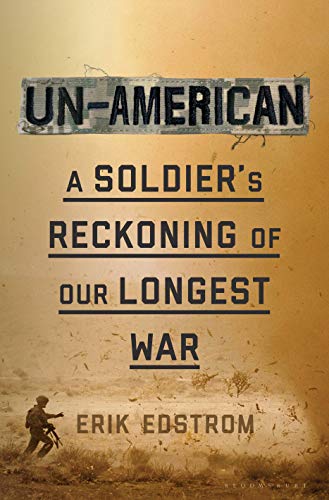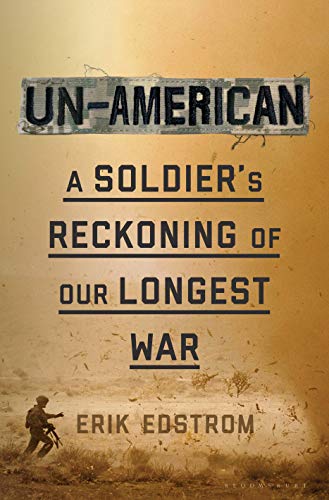by Kayla Williams
Erik Edstrom subtitled Un-American “A Soldier’s Reckoning of Our Longest War,” but this does quite not do justice to his topic’s scale. Instead, the profound, urgent questions he asks about the justification not only for U.S. involvement in Afghanistan, but for any armed military conflict, amount to a scathing indictment.
Some never think deeply about the true costs of war – not just for combatants, but also for civilians caught in the crossfire downrange and even for Americans who pay indirectly as resources flow away from domestic concerns. Others of us engage glancingly with these issues, perhaps for a short time when reading the Washington Post’s reporting on the Afghanistan Papers, or when trying to push away unpleasant memories of what we saw while deployed. Few have the mental and moral courage to deeply interrogate their own actions in combat. A vanishingly small number go on to share the results of that introspection, contextualize it, and share their findings. The result of Edstrom’s willingness to do so is a searing, meticulous assessment of the true costs of war.

Edstrom was part of the first class to apply to West Point after 9/11; and recounts attending the academy early in the War on Terror through the lens of hard-gained insight into what the military teaches – and what it leaves out – while developing future officers. He became an Army Ranger and platoon leader in an era when virtually all of his classmates and soldiers would deploy, some would come home mentally or physically wounded, and others would not come home at all. During his deployment to Afghanistan, he comes to doubt first the wisdom of specific missions they are ordered to carry out and finally the entire enterprise.
He describes pointless-seeming “presence patrols,” ill-placed outposts, interactions with Afghans that seem virtually designed to lose hearts and minds, firefights, and the aftermath of IED explosions. Edstrom eloquently conveys the process by which soldiers, abetted by military language itself, dehumanized Afghans. Though I was enlisted and served in Iraq, his account rang deeply true to my experiences.
When contemplating going to war, Edstrom demands three vital steps: imagine your own death, imagine the other side, and imagine the costs. Think about the American lives lost, bodies maimed, minds damaged by combat – don’t shy away, but really see them. Ponder the experience of Afghans, force yourself to picture parents weeping over the bodies of children killed by errant fire. Catalog the costs, the extraordinary financial expenses our nation has incurred and passed along to our own children as well as the opportunity costs of not spending those resources on infrastructure or climate change.
Edstrom’s rage at the losses he witnessed and experienced, as well as at the lies and errors he identified, comes through clearly in his writing — but it is not an incoherent rant. Unlike most memoirs, this volume is heavily footnoted; the author chose to ask hard questions, relentlessly pursue the answers, and show us how he found them. Edstrom illuminates his personal experiences with apropos quotes from a wide range of sources and contextualizes anecdotes with supporting data.
It is deeply, profoundly uncomfortable to go on the mental journey from enthusiastic cadet to fully awakened cynic with Edstrom. He forces acknowledgment of our shared culpability in an ongoing if slow-moving tragedy, which is painful – but deeply necessary if we are to learn any lessons about how – and whether – to wage war.
Edstrom, Erik. Un-American: A Soldier’s Reckoning of Our Longest War (Bloomsbury, May 2020).
About the Author:
Erik Edstrom graduated from West Point in 2007. He was then deployed to Afghanistan, where he served as infantry platoon leader. Erik spent the remainder of his military service as the Presidential Escort Platoon Leader during the Obama administration. He is a graduate of U.S. Army Ranger school, was selected for the U.S. Special Forces (SFAS), and was awarded the Bronze Star Medal. After the military, Erik went on to earn an MBA and Master of Science at Oxford University. He lives in Boston.

About the Reviewer:
Kayla Williams is the author of Plenty of Time When We Get Home: Love and Recovery in the Aftermath of War, and is currently a Senior Fellow and Director of the Military, Veterans and Society Program at the Center for a New American Security.
